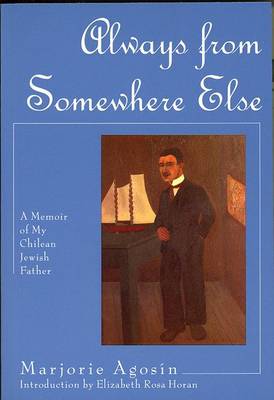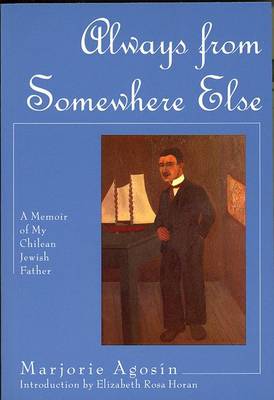
- Afhalen na 1 uur in een winkel met voorraad
- Gratis thuislevering in België vanaf € 30
- Ruim aanbod met 7 miljoen producten
- Afhalen na 1 uur in een winkel met voorraad
- Gratis thuislevering in België vanaf € 30
- Ruim aanbod met 7 miljoen producten
Zoeken
Omschrijving
In the tradition of her critically acclaimed memoir of her mother, A Cross and a Star, Marjorie Agosín traces the life story of her father, Moisés Agosín, a doctor, scientist, and classical pianist whose life reflects the lives of so many Jews of his generation, who were destined to be always refugees, always others--always from somewhere else. In the search for her father's origins, Agosín reaches into the past to the story of her grandparents, a tailor and a cigarette maker who met in Odessa in 1890. In their flight from persecution and their search for a better life, Abraham and Rachel Agosín traveled to Istanbul, then briefly to Marseilles, where Moisés is born in the interim between two long sea journeys, saved from the waters like the biblical Moses. The family's continuing search for a home brings them at last to Chile--first to the port city of Valparaiso and then to the fertile central valley, to Quillota, city of churches and avocados, where they find a measure of stability but remain, outsiders. Moisés Agosín studies in the capital, Santiago, and becomes a medical doctor and a respected research scientist. But decades after his parents' voyages, as Chile falls under the dictatorship of Pinochet, he takes his family on their final journey of exile, to the United States. Here he is once again treated as an outsider--this time, as a refugee from the Third World. And here Marjorie herself grows up understanding that for her family, life has taken the form of a fragile, incongruous thread, destined to be spent roaming from country to country, waiting for letters, inventing new languages, remembering distant ones. Marjorie Agosín weaves stories from the past and reflections from the present into a unique, poetic memoir. Her homage to her father becomes much more than a simple life story; it is a captivating and moving meditation on the boundaries of national and cultural identities, the meanings of exile and home, and the legacies of storytelling, memory, and love.
Specificaties
Betrokkenen
- Auteur(s):
- Uitgeverij:
Inhoud
- Aantal bladzijden:
- 264
- Taal:
- Engels
- Reeks:
Eigenschappen
- Productcode (EAN):
- 9781558612563
- Verschijningsdatum:
- 1/10/2000
- Uitvoering:
- Paperback
- Formaat:
- Trade paperback (VS)
- Afmetingen:
- 116 mm x 170 mm
- Gewicht:
- 181 g

Alleen bij Standaard Boekhandel
+ 33 punten op je klantenkaart van Standaard Boekhandel
Beoordelingen
We publiceren alleen reviews die voldoen aan de voorwaarden voor reviews. Bekijk onze voorwaarden voor reviews.








